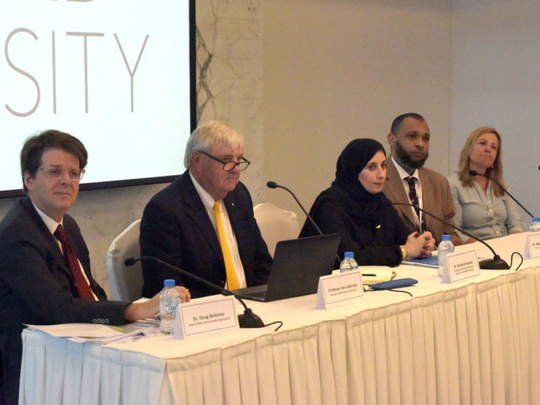
Abu Dhabi: A staggering 1.9 billion adults around the world are currently carrying excess weight as the obesity epidemic continues to spread, top health experts warned in the capital on Wednesday.
In addition, 340 million children of school age and 41 million children below the age of five years are also overweight and obese, said Dr Leanne Riley, team leader for surveillance of non-communicable diseases at the World Health Organisation (WHO).
“Sadly, the figures are even worse in the UAE, with the prevalence of overweight and obese schoolchildren in the UAE being roughly double the global prevalence. One in every three school-age children is obese or overweight, and 17 per cent of schoolchildren are known to be obese,” Dr Riley said.
She was speaking at a press conference ahead of the Gulf Obesity Summit and Regional Congress 2018, which will gather international experts to discuss measures that could stem the rise of obesity around the world. The two-day conference will kick off in the capital on Thursday, and will see attendees from 50 regional and national obesity organisations.
According to experts, there are more people in the world today carrying excess weight than underweight people, and this has happened for the first time in human history. Not only are nearly two billion adults carrying excess weight but 650 million of them are obese, and the prevalence of obesity has tripled in the last four decades.
“Obesity is spreading like wildfire across the world, and the Gulf region has proven to be particularly susceptible. By implementing a comprehensive obesity prevention and management plan, combating obesity stigma, making healthy food available and providing safe spaces to exercise, we can stop the epidemic from spiralling out of control,” said Dr Ian Caterson, president of the World Obesity Federation.
The WHO already has set targets of a zero increase in the proportion of overweight children internationally by 2025, and of halting the rise in prevalence of diabetes and obesity among adolescents and adults by the same period.
To that end, experts commended the UAE’s implementation of a 50 per cent tax on sugary drinks, a move which is seen as the first step towards combating the scourge of excess weight and unhealthy eating.
“We know that multi-sector engagement is key to achieving our goal, and we have a number of initiatives aimed at improving nutritional standards, enhancing the urban environment and even measuring the impact of the tax on sugary drinks,” said Dr Farida Al Hosani, director of communicable diseases at the Abu Dhabi Department of Health.
Dr Doug Betcher, head of non-communicable diseases at the WHO, stressed that the environment itself should support the fight against obesity.
“The environment cannot be obesogenic in a way that promotes sedentary lifestyles and the consumption of high-calorie diets. We must also encourage more childhood activity and effective weight management in primary health care settings,” he said.












